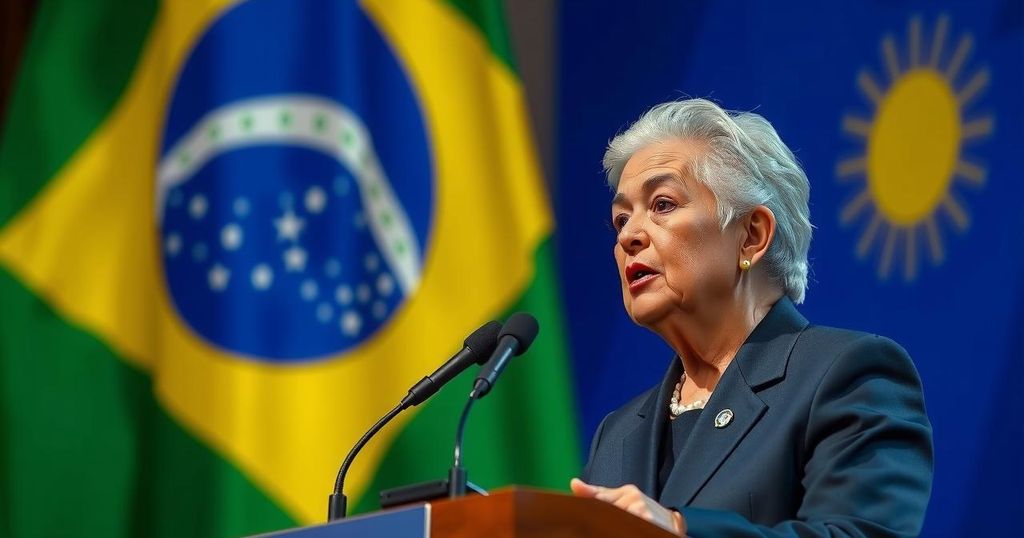Global news
AFP, ARGENTINA, ASIA, AZERBAIJAN, BRAZIL, BRAZILIAN FOREIGN MINISTRY, EUROPE, EUROPEAN UNION, FOREIGN MINISTRY, GUT, INTERNATIONAL RELATIONS, JAMES BAYS, LU, LUIZ INACIO LULA DA SILVA, LULA, MIDDLE EAST, MILITARY COUP, MUSEUM OF MODERN ART, NORTH AMERICA, REGIONAL COOPERATION, RIO DE JANEIRO, SOUTH AMERICA, SUPREME COURT, TRADE RELATIONS, UKRAINE, UN, UNITED STATES
Fatima Khan
0 Comments
Brazil’s Lula Launches Global Anti-Poverty Alliance at G20 Summit
Brazilian President Lula launched a global alliance to tackle poverty and hunger at the G20 Summit in Rio de Janeiro, addressing the impact of political choices and climate change. The initiative includes 81 countries, excluding Argentina, amid discussions overshadowed by global conflicts, especially in Ukraine and the Middle East. Security concerns rise following recent violence, while the U.S. reassesses its foreign policy direction under Biden.
At the G20 Summit in Rio de Janeiro, Brazilian President Luiz Inacio Lula da Silva inaugurated a new global alliance aimed at combating poverty and hunger. In his opening address, he emphasized that these pressing issues are often a consequence of political decisions and underscored the significant threats posed by climate change, urging global leaders to act decisively. This initiative has garnered support from 81 countries, excluding only Argentina among the G20 members. As the summit unfolds amid ongoing conflicts in the Middle East and Ukraine, tensions have been apparent, with discussions concerning these matters anticipated to occur informally. Notably, Russian President Vladimir Putin is absent, represented instead by Foreign Minister Sergey Lavrov. The United States, under President Biden, is participating in the summit, which may signal shifts in foreign policy directives, particularly regarding Ukraine and climate agreements. Additionally, the gathering highlights a pressing need for the G20 leaders to address stalled climate negotiations, particularly the imperative for climate finance for developing nations. Tight security measures have been put in place following a recent violent incident near Brazil’s Supreme Court, illustrating the heightened stakes surrounding the meeting. It is anticipated that discussions on technological innovations for the Global South will also emerge, driven by collaborations involving China, Brazil, and South Africa. With these significant themes in mind, the G20 Summit represents a crucial intersection of economic, political, and environmental dialogues on a global scale.
The G20 Summit is an assembly of the world’s largest economies, which convenes to address various pressing global issues, including economic stability, social challenges, and climate change. President Lula’s initiative reflects a response to the rising challenges of poverty and hunger exacerbated by geopolitical tensions and climate disruptions. The summit is particularly relevant considering the current global landscape marked by conflicts, environmental crises, and calls for equitable resource distribution, particularly for developing countries facing the brunt of climate impacts. This meeting is also contextualized by preceding diplomatic efforts and the shifting geopolitical alliances formed through international collaboration.
The G20 Summit in Brazil marks a pivotal moment for addressing the intertwined issues of poverty, hunger, and climate change, with President Lula’s new alliance standing at the forefront of this initiative. As global leaders congregate against the backdrop of wars and political polarization, the need for decisive action in these areas has never been more critical. The summit also serves as a platform for discussing technological cooperation and the reformation of climate finance strategies, highlighting the complexity and interconnectedness of contemporary global challenges.
Original Source: www.aljazeera.com




Post Comment